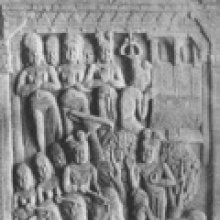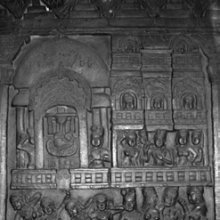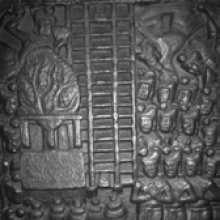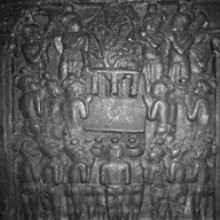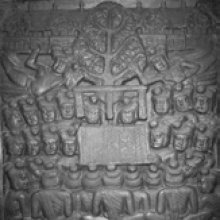Ajatasatru, Ajātaśatru, Ajātasatru, Ajatasattu, Ajātasattu, Ajatashatru, Ajata-shatru: 20 definitions
Introduction:
Ajatasatru means something in Buddhism, Pali, Hinduism, Sanskrit, Jainism, Prakrit, Marathi. If you want to know the exact meaning, history, etymology or English translation of this term then check out the descriptions on this page. Add your comment or reference to a book if you want to contribute to this summary article.
The Sanskrit term Ajātaśatru can be transliterated into English as Ajatasatru or Ajatashatru, using the IAST transliteration scheme (?).
Images (photo gallery)
In Hinduism
Purana and Itihasa (epic history)
Source: Cologne Digital Sanskrit Dictionaries: The Purana Index1a) Ajātaśatru (अजातशत्रु).—The son of Vidhisāra and father of Darbhaka (Arbhaka, Viṣṇu-purāṇa).*
- * Bhāgavata-purāṇa XII. 1. 6; Viṣṇu-purāṇa IV. 24. 14-15.
1b) The son of Bhūmimitra.1 His reign lasted for 25 (27?) years.2

The Purana (पुराण, purāṇas) refers to Sanskrit literature preserving ancient India’s vast cultural history, including historical legends, religious ceremonies, various arts and sciences. The eighteen mahapuranas total over 400,000 shlokas (metrical couplets) and date to at least several centuries BCE.
General definition (in Hinduism)
Source: WikiPedia: HinduismAjātasatru (अजातशत्रु): Having no enemy, friend of all born things, an epithet of Yudhishthira.
In Buddhism
Theravada (major branch of Buddhism)
Source: Pali Kanon: Pali Proper NamesSon of Bimbisara, King of Magadha, and therefore half brother to Abhayarajakumara. He succeeded his father to the throne. His mother was a daughter of Mahakosala (J.iii.121), and he married Vajira, Pasenadis daughter (J.iv.343), by whom be had a son Udayibhadda (D.i.50).
Ajatasattu grew up to be a noble and handsome youth. Devadatta was, at this time, looking for ways and means of taking revenge on the Buddha, and seeing in the prince a very desirable weapon, he exerted all his strength to win him to his side. Ajatasattu was greatly impressed by Devadattas powers of iddhi and became his devoted follower (Vin.ii.185; J.i.185-6). He built for him a monastery at Gayasisa and waited upon him morning and evening carrying food for him, sometimes as much as five hundred cartloads in five hundred cooking pans (S.ii.242).
Devadatta incited him to seize the throne, killing his father if necessary. When Bimbisara learnt of the princes intentions he abdicated in his favour. But Devadatta was not satisfied till Bimbisara, who was one of the Buddhas foremost supporters, was killed. (DA.i.135-7). According to the Sankicca Jataka (J.v.262ff.) he had killed his father in previous births too.
Ajatasattu helped Devadatta in several of the latters attempts to kill the Buddha (See Devadatta). In the Sanjiva Jataka (J. i. 510 f.) we are told that in past lives he had associated with the sinful and once lost his life as a result.
Later he was filled with remorse for these past misdeeds as he confesses himself (D.i.85); but evidently, for very shame, he refrained from visiting the Buddha till he was won over by the persuasions of his physician Jivaka Komarabhacca. And when in the end he did go to the Buddha, it was in great fear and trembling; so nervous was he that he imagined conspirators in the very silence surrounding the Buddha where he dwelt in the monastery, in Jivakas Mango grove at Rajagaha (D.i.49-50; J.v.262-9. An illustration of this visit is the subject of one of the bas reliefs on the Barhut Tope; Cunningham, Pl. xvi., fig.36, and p.135).
It was on the occasion of this visit that the Samannaphala Sutta was preached. The king admits that he had been to various teachers before, but had failed to find satisfaction in their teachings. It is noteworthy that the Buddha greets the king cordially on his arrival and makes no mention whatever of the kings impiety. Instead, when Ajatasattu expresses his repentance at the end of the discourse, the Buddha accepts his confession and lets him off almost too lightly. But after the king had departed the Buddha tells the monks how the kings misdeeds had wrought his undoing both in this world and the next, for if he had not been guilty of them, the Eye of Truth (Sotapattimagga, says the Commentary) would have been opened for him on the occasion of this sermon.
Theravāda is a major branch of Buddhism having the the Pali canon (tipitaka) as their canonical literature, which includes the vinaya-pitaka (monastic rules), the sutta-pitaka (Buddhist sermons) and the abhidhamma-pitaka (philosophy and psychology).
Mahayana (major branch of Buddhism)
Source: Wisdom Library: Maha Prajnaparamita SastraAjātaśatru (अजातशत्रु) is the name of person living at Rājagṛha, when the Buddha was dwelling there at the beginning of the discourse in the 2nd century Mahāprajñāpāramitāśāstra chapter V. Accordingly, “after the Buddha’s nirvāṇa, king A chö che (Ajātaśatru), whose lineage had weakened, abandoned the great city of Rājagṛha and built a small city one yojana in size nearby called Po lo li fou to lo (Pāṭaliputra)”.

Mahayana (महायान, mahāyāna) is a major branch of Buddhism focusing on the path of a Bodhisattva (spiritual aspirants/ enlightened beings). Extant literature is vast and primarely composed in the Sanskrit language. There are many sūtras of which some of the earliest are the various Prajñāpāramitā sūtras.
General definition (in Buddhism)
Source: Wisdom Library: BuddhismAjatashatru:—King of the state of Magadha. He murdered his father (King Bimbisara) to ascend to the throne. He later repented of his evil ways and became a devoted follower of the Buddha.
Source: academia.edu: The Chronological History of BuddhismAccording to Samannaphala Sutta of Dirgha Nikaya, King Ajatashatru, the son of Bimbisara mentions six contemporary gurus of different philosophies in his conversation with Buddha. The names of six gurus are; 1. Purana Kassapa 2. Maskari Goshaliputta 3. Ajita Keshakambalin 4. Pakudha Kachchayana (Katyayana) 5. Sanjaya Belattiputta 6. Nigantha Nataputta.
King Shrenya Bimbisara of Magadha was killed by his own son Ajatashatru in 1873 BC. Thus, Ajatashatru became the king of Magadha in 1873 BC.
In Jainism
General definition (in Jainism)
Source: academia.edu: The epoch of the Mahavira-nirvanaAccording to Samannaphala Sutta of Dirgha Nikaya, King Ajatashatru mentions six contemporary gurus of different philosophies in his conversation with Buddha. The names of six gurus are;
- Purana Kassapa,
- Maskari Goshaliputta,
- Ajita Keshakambalin,
- Pakudha Kachchayana (Katyayana),
- Sanjaya Belattiputta,
- Nigantha Nataputta.
Jain text Bhagavati Sutta mentions that Goshala Mankhaliputta was the contemporary of Mahavira.

Jainism is an Indian religion of Dharma whose doctrine revolves around harmlessness (ahimsa) towards every living being. The two major branches (Digambara and Svetambara) of Jainism stimulate self-control (or, shramana, ‘self-reliance’) and spiritual development through a path of peace for the soul to progess to the ultimate goal.
Languages of India and abroad
Pali-English dictionary
Source: BuddhaSasana: Concise Pali-English Dictionaryajātasattu : (m.) a born enemy; name of a king.

Pali is the language of the Tipiṭaka, which is the sacred canon of Theravāda Buddhism and contains much of the Buddha’s speech. Closeley related to Sanskrit, both languages are used interchangeably between religions.
Marathi-English dictionary
Source: DDSA: The Molesworth Marathi and English Dictionaryajātaśatru (अजातशत्रु).—a (S To whom there never has been an enemy.) Mild, gentle, inoffensive, harmless.
Source: DDSA: The Aryabhusan school dictionary, Marathi-Englishajātaśatrū (अजातशत्रू).—a Mild, one without enemies.
Marathi is an Indo-European language having over 70 million native speakers people in (predominantly) Maharashtra India. Marathi, like many other Indo-Aryan languages, evolved from early forms of Prakrit, which itself is a subset of Sanskrit, one of the most ancient languages of the world.
Sanskrit dictionary
Source: DDSA: The practical Sanskrit-English dictionaryAjātaśatru (अजातशत्रु).—a. [na jātaḥ śatruḥ asya; jātasya jantumātrasya na śatruḥ] having no enemy or adversary, not an enemy of any one.
-riḥ-truḥ epithet of Yudhiṣṭhira; हन्त जातमजातारेः प्रथमेन त्वयारिणा (hanta jātamajātāreḥ prathamena tvayāriṇā) Śiśupālavadha 2.82; न द्वेक्षि यज्जनमतस्त्वमजातशत्रुः (na dvekṣi yajjanamatastvamajātaśatruḥ) Ve.3.15; also of Śiva and various other persons.
Ajātaśatru is a Sanskrit compound consisting of the terms ajāta and śatru (शत्रु). See also (synonyms): ajātāri.
Source: Cologne Digital Sanskrit Dictionaries: Edgerton Buddhist Hybrid Sanskrit DictionaryAjātaśatru (अजातशत्रु).—(= Pali Ajātasattu), name of a king of Magadha, son of Bimbisāra: Saddharmapuṇḍarīka 5.5 (attends the Buddha); Divyāvadāna 55.17; 279.20 ff.; 369.9; 380.18; 545.8; Avadāna-śataka i.54.6 ff.; 83.6; 88.7; 308.5 ff.; ii.182.1 ff.; Śikṣāsamuccaya 274.3—4 (from Tathā- gataguhya-sūtra); (Ārya-)Mañjuśrīmūlakalpa 590.2 (in the sequel repeatedly referred to as Ajātākhya, e.g. ajātākhyo nṛpottamaḥ 592.7); Karmavibhaṅga (and Karmavibhaṅgopadeśa) 45.3; 49.20 (summary of his story), et alibi.
Source: Cologne Digital Sanskrit Dictionaries: Shabda-Sagara Sanskrit-English DictionaryAjātaśatru (अजातशत्रु).—m.
(-truḥ) A name of Yudhisht'Hir. E. ajāta unborn, and śatru an enemy, who never made an enemy.
Source: Cologne Digital Sanskrit Dictionaries: Cappeller Sanskrit-English DictionaryAjātaśatru (अजातशत्रु).—[adjective] having no enemies (existent), [Epithet] of Yudhiṣṭhira etc.
Source: Cologne Digital Sanskrit Dictionaries: Aufrecht Catalogus CatalogorumAjātaśatru (अजातशत्रु) as mentioned in Aufrecht’s Catalogus Catalogorum:—guru of Viṣṇuyaśas: Puṣpasūtrabhāṣya.
Source: Cologne Digital Sanskrit Dictionaries: Monier-Williams Sanskrit-English Dictionary1) Ajātaśatru (अजातशत्रु):—[=a-jāta-śatru] [from a-jāta] mfn. (ajāta-) having no enemy
2) [v.s. ...] having no adversary or equal (Indra), [Ṛg-veda]
3) [v.s. ...] m. (us) Name of Śiva, of Yudhiṣṭhira, of a king of Kāśī, of a son of Śamika, of a son of Vidmisāra or Bimbisāra (contemporary of Śākyamuni)
Source: Cologne Digital Sanskrit Dictionaries: Goldstücker Sanskrit-English DictionaryAjātaśatru (अजातशत्रु):—[bahuvrihi compound] I. m. f. n.
(-truḥ-truḥ-tru) 1) Having no ene-mies existent.
2) Having no one existent who is worth being called an enemy. Ii. m.
(-truḥ) A proper name or a synonyme of
1) Śiva,
2) Yudhiṣṭhira,
3) A king of Kāśi,
4) A son of Śamīka,
5) A son of Vidmisāra, or according to others,
6) A son of Bimbisāra and contemporary of Śākyamuni. E. ajāta and śatru.
Source: Cologne Digital Sanskrit Dictionaries: Yates Sanskrit-English DictionaryAjātaśatru (अजातशत्रु):—[a-jāta-śatru] (truḥ) 2. m. Name of Yudhiṣṭhira.
[Sanskrit to German]
Sanskrit, also spelled संस्कृतम् (saṃskṛtam), is an ancient language of India commonly seen as the grandmother of the Indo-European language family (even English!). Closely allied with Prakrit and Pali, Sanskrit is more exhaustive in both grammar and terms and has the most extensive collection of literature in the world, greatly surpassing its sister-languages Greek and Latin.
Kannada-English dictionary
Source: Alar: Kannada-English corpusAjātaśatru (ಅಜಾತಶತ್ರು):—
1) [noun] one who has no adversary or enemy.
2) [noun] Śiva.
3) [noun] an epithet of king Yudhiṣtira in the epic Mahābhārata.
Kannada is a Dravidian language (as opposed to the Indo-European language family) mainly spoken in the southwestern region of India.
See also (Relevant definitions)
Partial matches: Shatru, Ajata.
Starts with: Ajatashatrukaukrityavinodana.
Full-text (+79): Ajatari, Ajatashatrava, Pataliputra, Dharbaka, Udayibhadra, Udayashva, Ajata, Ajataripu, Bimbisara, Ajatakhya, First Buddhist Council, Viditvisesa, Ajatshatru, Dhanapala, Haritamata Jataka, Vaidehiputra, Yudhishthira, Sattapanniguha, Videhiputta, Rajagaha.
Relevant text
Search found 69 books and stories containing Ajatasatru, Ajātaśatru, Ajātasatru, Ajatasattu, Ajātasattu, Ajatashatru, Ajātaśatrū, Ajata-shatru, Ajāta-śatru, Ajata-satru; (plurals include: Ajatasatrus, Ajātaśatrus, Ajātasatrus, Ajatasattus, Ajātasattus, Ajatashatrus, Ajātaśatrūs, shatrus, śatrus, satrus). You can also click to the full overview containing English textual excerpts. Below are direct links for the most relevant articles:
Amaravati Art in the Context of Andhra Archaeology (by Sreyashi Ray chowdhuri)
Ajatasatru visits Buddha < [Chapter 3 - Amarāvatī and the Formative Stage of the Buddhist Art]
Garga Samhita (English) (by Danavir Goswami)
Verse 8.13.56 < [Chapter 13 - A Thousand Names of Lord Balarāma]
A Discourse on Paticcasamuppada (by Venerable Mahasi Sayadaw)
Chapter 10 - Story Of Ajatasattu < [Part 8]
Chapter 9 - Four Kinds Of Kamma < [Part 8]
Chapter 4 - Ignorance And Illusion < [Part 2]
The Buddha and His Disciples (by Venerable S. Dhammika)
Maha Prajnaparamita Sastra (by Gelongma Karma Migme Chödrön)
Appendix 4 - Buddha’s subjugation of the elephant Nālāgiri (or Dhanapāla) < [Chapter XLII - The Great Loving-kindness and the Great Compassion of the Buddhas]
Appendix 7 - Description of Pāṭaliputra (present Patna) < [Chapter V - Rājagṛha]
Appendix 6 - Why the Buddha treated Devadatta as kheṭāśika (kheḷāsaka) < [Chapter XLI - The Eighteen Special Attributes of the Buddha]
Bihar and Eastern Uttar Pradesh (early history) (by Prakash Narayan)
State formation < [Chapter 1 - Political Formation at the time of Buddha]
Parents and Sons < [Chapter 4 - Social Process, Structures and Reformations]
Vanna (social identification) < [Chapter 4 - Social Process, Structures and Reformations]
Related products
